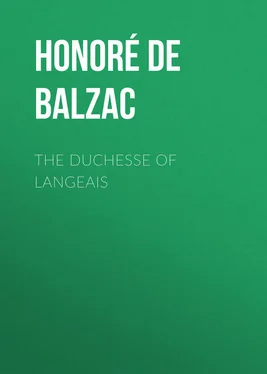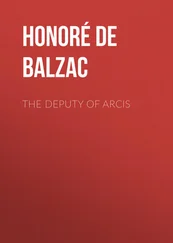Honoré Balzac - The Duchesse of Langeais
Здесь есть возможность читать онлайн «Honoré Balzac - The Duchesse of Langeais» — ознакомительный отрывок электронной книги совершенно бесплатно, а после прочтения отрывка купить полную версию. В некоторых случаях можно слушать аудио, скачать через торрент в формате fb2 и присутствует краткое содержание. Жанр: literature_19, foreign_antique, foreign_prose, на английском языке. Описание произведения, (предисловие) а так же отзывы посетителей доступны на портале библиотеки ЛибКат.
- Название:The Duchesse of Langeais
- Автор:
- Жанр:
- Год:неизвестен
- ISBN:нет данных
- Рейтинг книги:3 / 5. Голосов: 1
-
Избранное:Добавить в избранное
- Отзывы:
-
Ваша оценка:
- 60
- 1
- 2
- 3
- 4
- 5
The Duchesse of Langeais: краткое содержание, описание и аннотация
Предлагаем к чтению аннотацию, описание, краткое содержание или предисловие (зависит от того, что написал сам автор книги «The Duchesse of Langeais»). Если вы не нашли необходимую информацию о книге — напишите в комментариях, мы постараемся отыскать её.
The Duchesse of Langeais — читать онлайн ознакомительный отрывок
Ниже представлен текст книги, разбитый по страницам. Система сохранения места последней прочитанной страницы, позволяет с удобством читать онлайн бесплатно книгу «The Duchesse of Langeais», без необходимости каждый раз заново искать на чём Вы остановились. Поставьте закладку, и сможете в любой момент перейти на страницу, на которой закончили чтение.
Интервал:
Закладка:
Each family ruined by the Revolution and the abolition of the law of primogeniture thought only of itself, and not at all of the great family of the noblesse. It seemed to them that as each individual grew rich, the party as a whole would gain in strength. And herein lay their mistake. Money, likewise, is only the outward and visible sign of power. All these families were made up of persons who preserved a high tradition of courtesy, of true graciousness of life, of refined speech, with a family pride, and a squeamish sense of noblesse oblige which suited well with the kind of life they led; a life wholly filled with occupations which become contemptible so soon as they cease to be accessories and take the chief place in existence. There was a certain intrinsic merit in all these people, but the merit was on the surface, and none of them were worth their face-value.
Not a single one among those families had courage to ask itself the question, “Are we strong enough for the responsibility of power?” They were cast on the top, like the lawyers of 1830; and instead of taking the patron’s place, like a great man, the Faubourg Saint-Germain showed itself greedy as an upstart. The most intelligent nation in the world perceived clearly that the restored nobles were organizing everything for their own particular benefit. From that day the noblesse was doomed. The Faubourg Saint-Germain tried to be an aristocracy when it could only be an oligarchy – two very different systems, as any man may see for himself if he gives an intelligent perusal to the list of the patronymics of the House of Peers.
The King’s Government certainly meant well; but the maxim that the people must be made to will everything, even their own welfare, was pretty constantly forgotten, nor did they bear in mind that La France is a woman and capricious, and must be happy or chastised at her own good pleasure. If there had been many dukes like the Duc de Laval, whose modesty made him worthy of the name he bore, the elder branch would have been as securely seated on the throne as the House of Hanover at this day.
In 1814 the noblesse of France were called upon to assert their superiority over the most aristocratic bourgeoisie in the most feminine of all countries, to take the lead in the most highly educated epoch the world had yet seen. And this was even more notably the case in 1820. The Faubourg Saint-Germain might very easily have led and amused the middle classes in days when people’s heads were turned with distinctions, and art and science were all the rage. But the narrow-minded leaders of a time of great intellectual progress all of them detested art and science. They had not even the wit to present religion in attractive colours, though they needed its support. While Lamartine, Lamennais, Montalembert, and other writers were putting new life and elevation into men’s ideas of religion, and gilding it with poetry, these bunglers in the Government chose to make the harshness of their creed felt all over the country. Never was nation in a more tractable humour; La France, like a tired woman, was ready to agree to anything; never was mismanagement so clumsy; and La France, like a woman, would have forgiven wrongs more easily than bungling.
If the noblesse meant to reinstate themselves, the better to found a strong oligarchy, they should have honestly and diligently searched their Houses for men of the stamp that Napoleon used; they should have turned themselves inside out to see if peradventure there was a Constitutionalist Richelieu lurking in the entrails of the Faubourg; and if that genius was not forthcoming from among them, they should have set out to find him, even in the fireless garret where he might happen to be perishing of cold; they should have assimilated him, as the English House of Lords continually assimilates aristocrats made by chance; and finally ordered him to be ruthless, to lop away the old wood, and cut the tree down to the living shoots. But, in the first place, the great system of English Toryism was far too large for narrow minds; the importation required time, and in France a tardy success is no better than a fiasco. So far, moreover, from adopting a policy of redemption, and looking for new forces where God puts them, these petty great folk took a dislike to any capacity that did not issue from their midst; and, lastly, instead of growing young again, the Faubourg Saint-Germain grew positively older.
Etiquette, not an institution of primary necessity, might have been maintained if it had appeared only on state occasions, but as it was, there was a daily wrangle over precedence; it ceased to be a matter of art or court ceremonial, it became a question of power. And if from the outset the Crown lacked an adviser equal to so great a crisis, the aristocracy was still more lacking in a sense of its wider interests, an instinct which might have supplied the deficiency. They stood nice about M. de Talleyrand’s marriage, when M. de Talleyrand was the one man among them with the steel-encompassed brains that can forge a new political system and begin a new career of glory for a nation. The Faubourg scoffed at a minister if he was not gently born, and produced no one of gentle birth that was fit to be a minister. There were plenty of nobles fitted to serve their country by raising the dignity of justices of the peace, by improving the land, by opening out roads and canals, and taking an active and leading part as country gentlemen; but these had sold their estates to gamble on the Stock Exchange. Again the Faubourg might have absorbed the energetic men among the bourgeoisie, and opened their ranks to the ambition which was undermining authority; they preferred instead to fight, and to fight unarmed, for of all that they once possessed there was nothing left but tradition. For their misfortune there was just precisely enough of their former wealth left them as a class to keep up their bitter pride. They were content with their past. Not one of them seriously thought of bidding the son of the house take up arms from the pile of weapons which the nineteenth century flings down in the market-place. Young men, shut out from office, were dancing at Madame’s balls, while they should have been doing the work done under the Republic and the Empire by young, conscientious, harmlessly employed energies. It was their place to carry out at Paris the programme which their seniors should have been following in the country. The heads of houses might have won back recognition of their titles by unremitting attention to local interests, by falling in with the spirit of the age, by recasting their order to suit the taste of the times.
But, pent up together in the Faubourg Saint-Germain, where the spirit of the ancient court and traditions of bygone feuds between the nobles and the Crown still lingered on, the aristocracy was not whole-hearted in its allegiance to the Tuileries, and so much the more easily defeated because it was concentrated in the Chamber of Peers, and badly organized even there. If the noblesse had woven themselves into a network over the country, they could have held their own; but cooped up in their Faubourg, with their backs against the Chateau, or spread at full length over the Budget, a single blow cut the thread of a fast-expiring life, and a petty, smug-faced lawyer came forward with the axe. In spite of M. Royer-Collard’s admirable discourse, the hereditary peerage and law of entail fell before the lampoons of a man who made it a boast that he had adroitly argued some few heads out of the executioner’s clutches, and now forsooth must clumsily proceed to the slaying of old institutions.
There are examples and lessons for the future in all this. For if there were not still a future before the French aristocracy, there would be no need to do more than find a suitable sarcophagus; it were something pitilessly cruel to burn the dead body of it with fire of Tophet. But though the surgeon’s scalpel is ruthless, it sometimes gives back life to a dying man; and the Faubourg Saint-Germain may wax more powerful under persecution than in its day of triumph, if it but chooses to organize itself under a leader.
Читать дальшеИнтервал:
Закладка:
Похожие книги на «The Duchesse of Langeais»
Представляем Вашему вниманию похожие книги на «The Duchesse of Langeais» списком для выбора. Мы отобрали схожую по названию и смыслу литературу в надежде предоставить читателям больше вариантов отыскать новые, интересные, ещё непрочитанные произведения.
Обсуждение, отзывы о книге «The Duchesse of Langeais» и просто собственные мнения читателей. Оставьте ваши комментарии, напишите, что Вы думаете о произведении, его смысле или главных героях. Укажите что конкретно понравилось, а что нет, и почему Вы так считаете.












